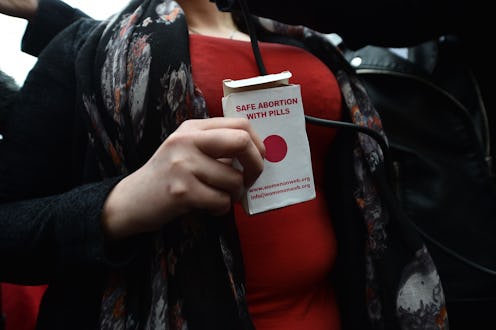News
Why This Doctor Decided To Start A Service That Mails Abortion Pills To American Women

Since 2006, an online collective has provided abortion pills to pregnant people in countries where the procedure is illegal. For years, Women on Web has remotely conducted online consultations and shipped pills to multiple countries, but not to the United States — until now. Dr. Rebecca Gomperts, who founded Women on Web, has launched a new service called Aid Access that ships abortion pills to Americans.
According to The Atlantic, receiving a shipment of abortion pills from Aid Access costs $95, though the service will attempt to offset costs for those who can't afford it. Similar to Women on Web, Aid Access will ship misoprostol and mifepristone pills to those who are seeking an abortion but cannot access it where they are. Together, these pills are roughly 97 percent effective at inducing an abortion during the first trimester of a pregnancy, The Hill reported.
Gomperts tells Bustle that she was initially wary of launching an abortion pill service for the United States because she was worried about endangering Women on Web and the people involved with it. She knew that if the U.S. anti-abortion movement challenged Women on Web, it could potentially jeopardize abortion access in other countries where the service operates. The United States also wasn't on her radar at first, because abortion is technically legal here.
But research from Women on Web revealed that pregnant Americans nonetheless sought abortion pills online — not only because of restrictive state laws, but also due to prohibitively high health care costs, lack of transportation to clinics, and a shortage of information or consultations. In an ideal world, Gomperts says, Aid Access — which is filling in gaps left by ineffective policies — "shouldn't be necessary."
"It’s not an isolated problem," Gomperts says. "It’s a problem of health care access in general in the United States, where many people cannot access any form of health care because they don’t have health insurance and they cannot afford to pay to go to a doctor. It's a more embedded issue than abortion itself."
This research, coupled with the numerous requests she received from Americans who were struggling to access abortions, prompted Gomperts to launch Aid Access despite the risks — but as a separate initiative from Women on Web.
“I got an email from a woman who was living in a car with two kids,” she told The Atlantic. “Something had to be done.”
According to Gomperts, every step of Aid Access' consultation and distribution process is completely legal. She tells Bustle that "the whole debate about safety" is over, because scientific research has proven that abortion pills are safe, and that Aid Access makes sure to provide detailed consultations for people seeking abortions. She also told The Atlantic that the FDA allows individuals to import medications for personal use, though the FDA does have many restrictions on its personal use policy. Bustle has reached out to the FDA for comment.
Gomperts tells Bustle that Aid Access first went online in April, and she estimates that it has already sent out approximately 600 shipments of abortion pills. Like Women on Web, Aid Access first uses an online screening process to confirm a pregnant person's eligibility to use the pills — namely, to make sure that they are no more than nine weeks pregnant, because the pills are less effective after that. Then, Gomperts fills each prescription and sends it to an Indian pharmacy that subsequently ships the pills stateside.
The remote services provided by Women on Web have transformed abortion access in other countries that face reproductive health care restrictions. In Ireland, for example, the group openly smuggled abortion pills to thousands of pregnant people before this year's referendum overturned the country's abortion ban. Although it is not yet clear what impact Aid Access could have on abortion access in the United States — where, as Gomperts points out, "there is a constitutional right to abortion" — Gomperts hopes that telemedical services like this will push lawmakers to pass better policies.
Any potential change in policy will depend on "how the U.S. is developing in political terms in general — and legal terms, because policies need sane politicians," Gomperts tells Bustle. "And sane lawyers. And that is a problem that you have [in the United States] now."
In Ireland, Gomperts says, abortion pill services like Women on Web were able to drive the country toward a referendum because lawmakers were forced to confront the difficult situations of people who seek abortions in the first place. Moreover, she argues, Ireland has seen the emergence of "a new generation of politicians that really take science seriously," and who have taken into account the negative effects produced by anti-abortion laws. Ultimately, Gomperts says, restricted abortion access in the United States and around the world is an urgent problem that requires immediate solutions.
"I see this as humanitarian aid," Gomperts adds. "There’s a real need, and I think there is no excuse not to address it and to do something about it."